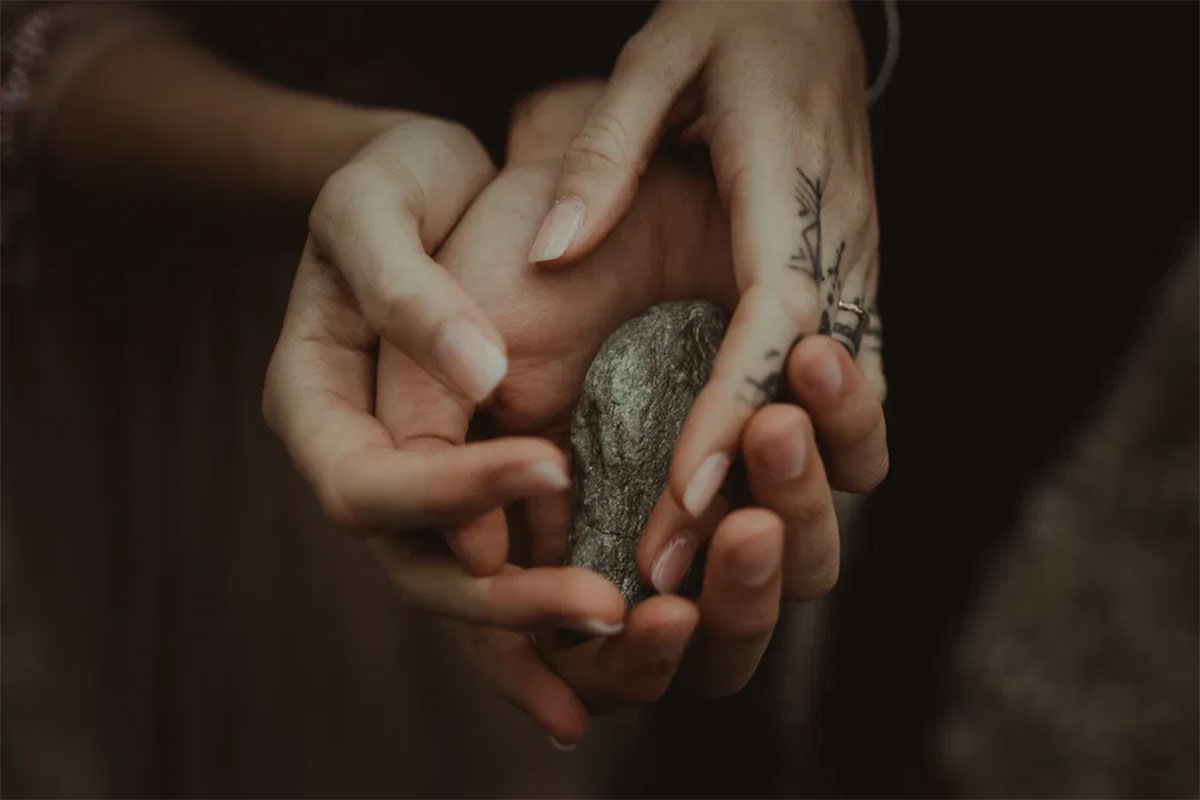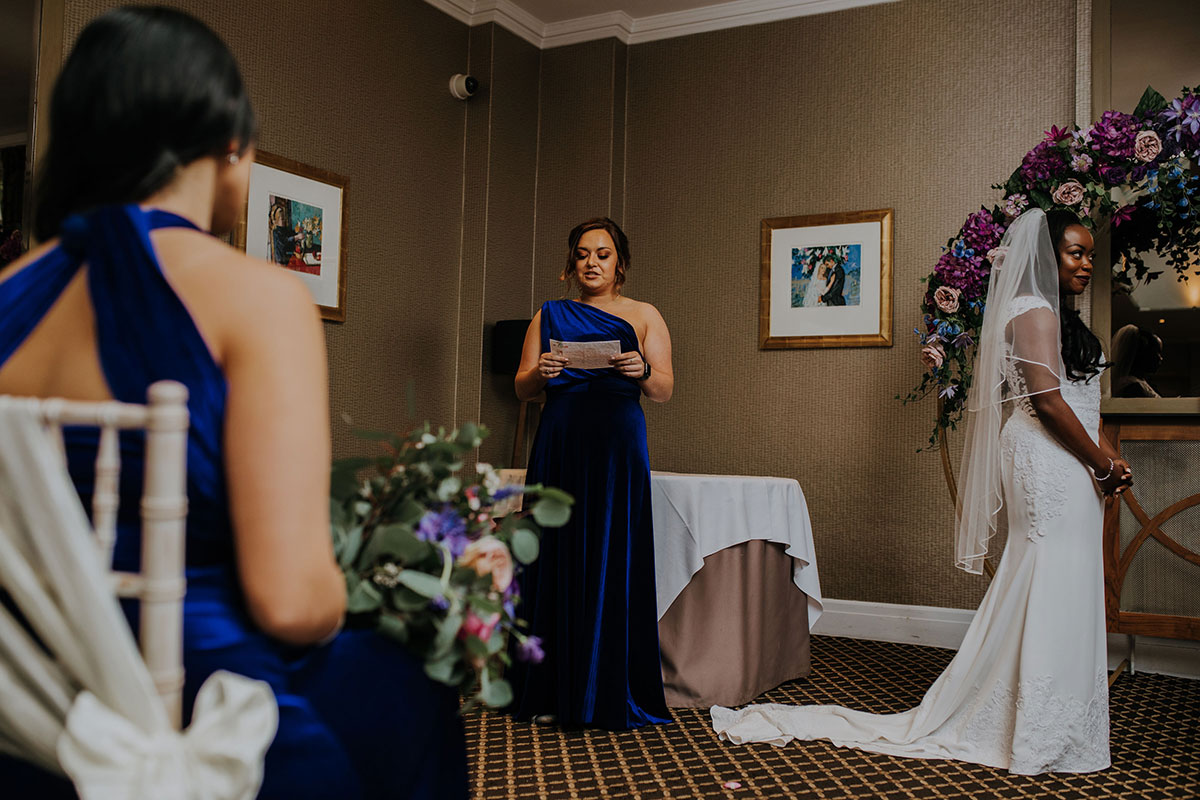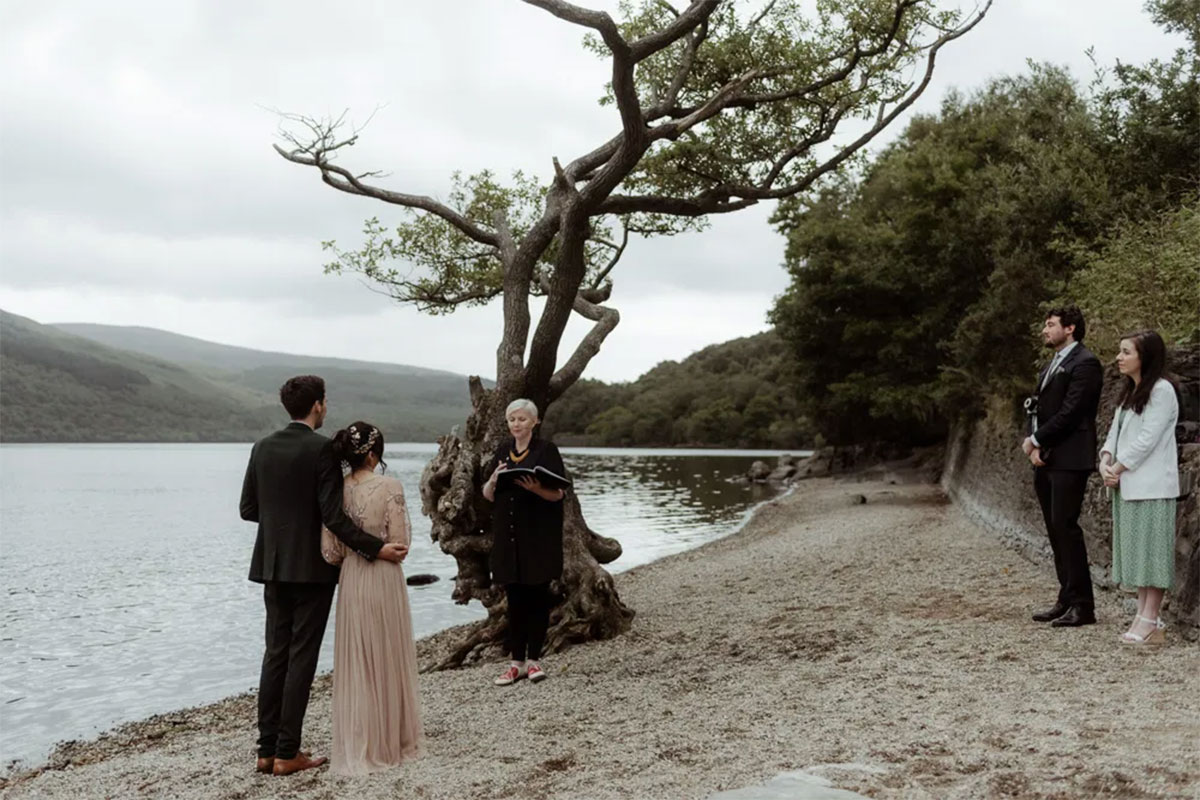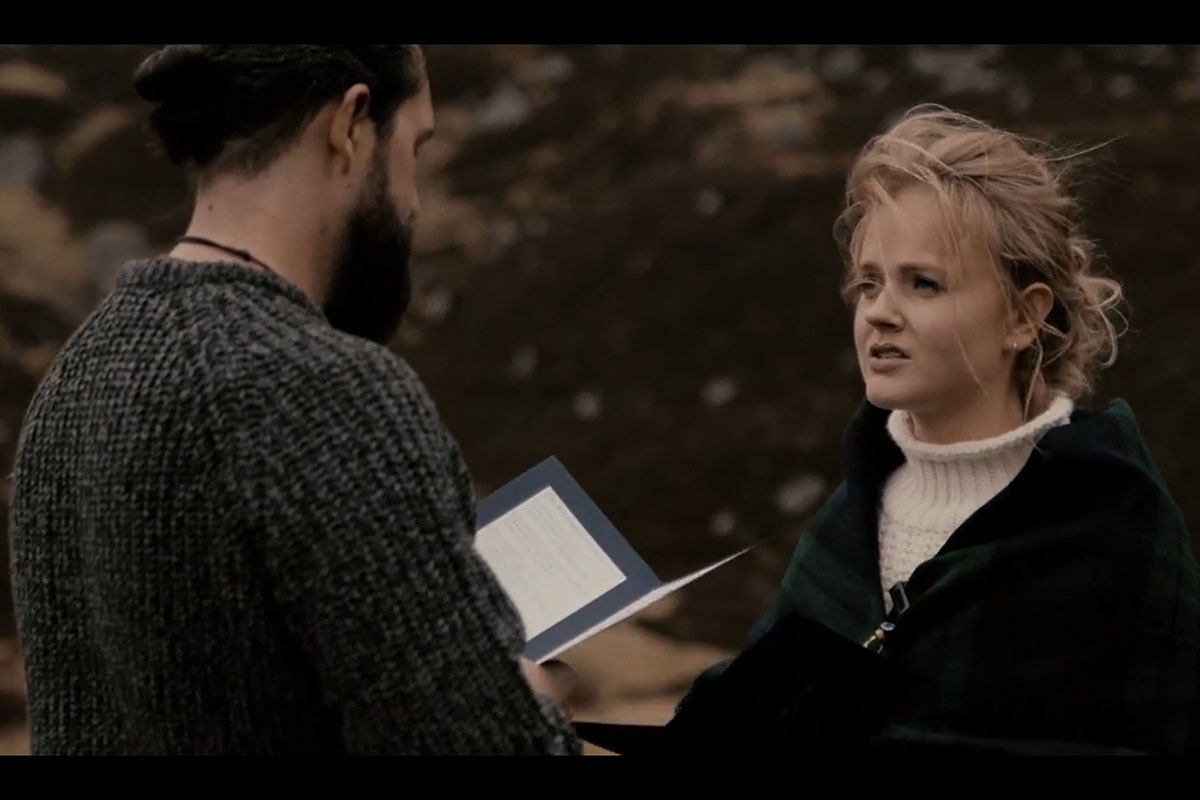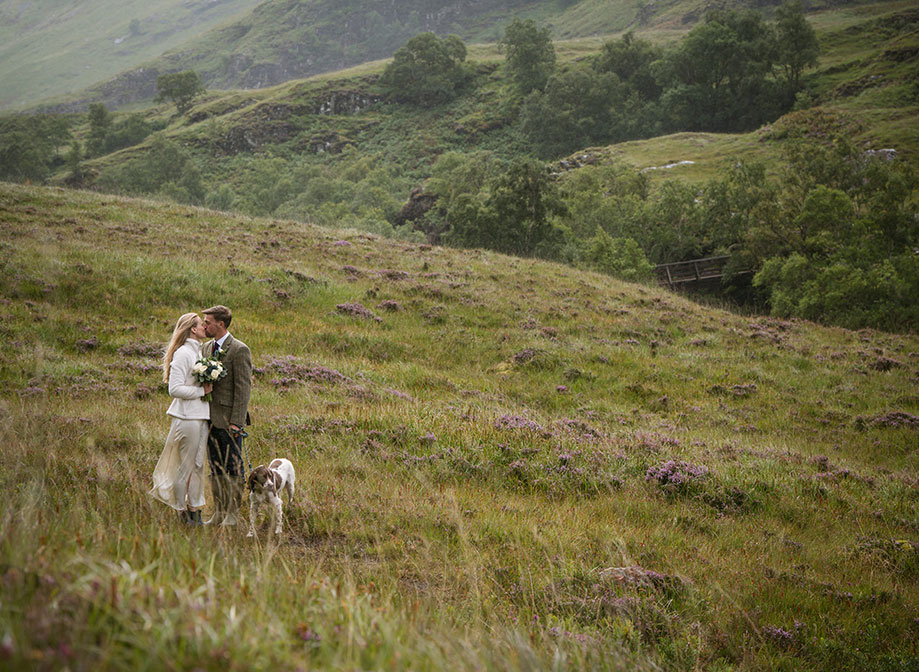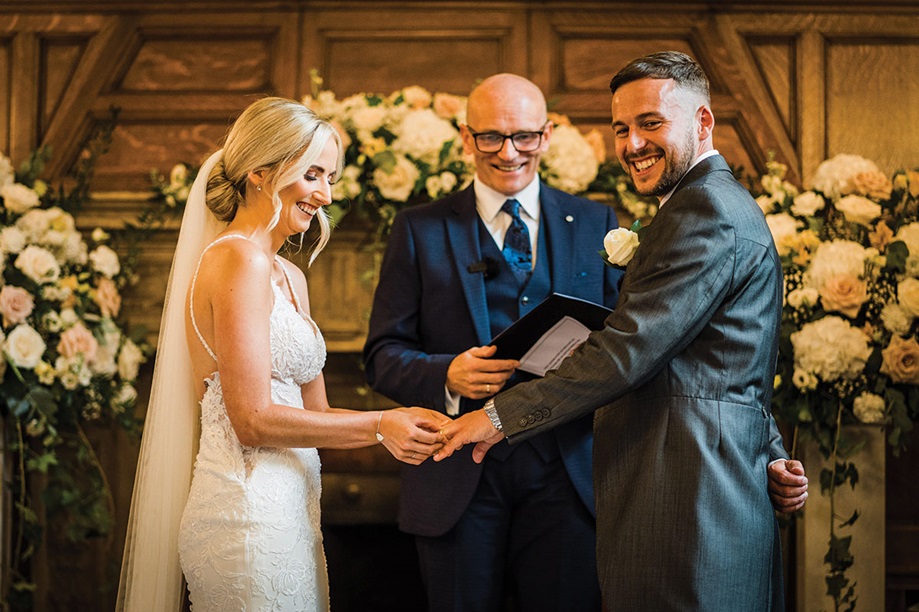Scotland’s most trusted provider of Humanist ceremonies considers the rituals, readings and vows you might want to include to help you make your ceremony unique and heartfelt
This article contains paid-for content created in collaboration with Humanist Society Scotland
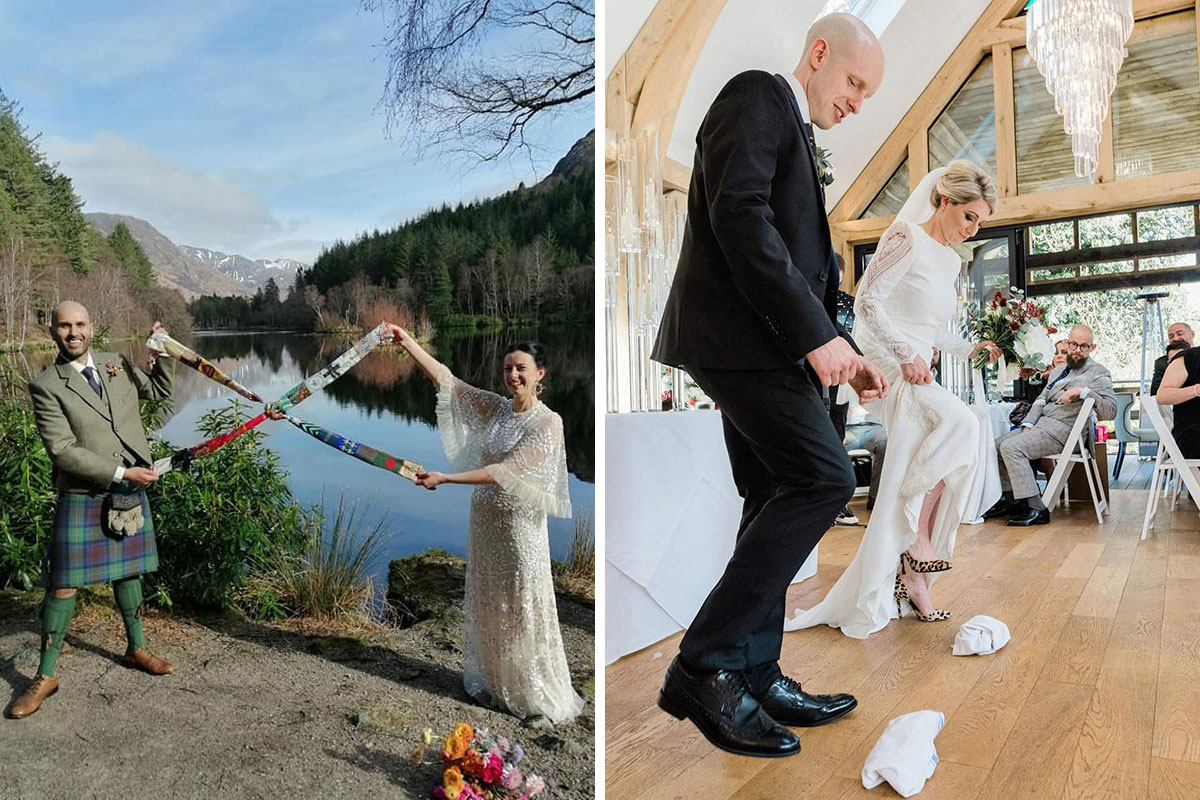
Left: A bride and groom after performing their handfasting; Right: The smashing of the glass is popular in Jewish culture. (Photo: The Gibsons)
A Humanist Society Scotland ceremony is wholeheartedly inclusive and respectful of those of all faiths and none, but unlike religious and civil ceremonies you, the couple, have total control over your ceremony and its content.
You can even have a non-legal ceremony or vow renewal without the legal part. Your ceremony should be as individual and unique as you are.Your story will of course be unique to the two of you, but there are other ways to personalise your ceremony. It can be traditional or unconventional, long or short.
You can have the ceremony anywhere you choose – in a hotel, up a mountain, by a loch, or even in your own home or garden.
You can incorporate symbolic gestures. It can include poems, readings, music and even singing and dancing.
And, of course, you can say personal vows or promises in addition to any legal declaration. It’s your ceremony, so you should do what’s right for you as a couple.
Symbolic gestures
Symbolic gestures, or rituals, can add an extra dimension to any ceremony and can make it even more personal and memorable for you and for your guests.
They can involve just the two of you or include your ‘VIPs’. Some of the most popular include: handfasting; oathing stone; drinking from the quaich; unity candle; sand ceremony.
The most popular Celtic marriage rituals right now are probably handfasting, the oathing stone and drinking from the quaich.
Handfasting involves the wrapping of cord, ribbon or cloth such as tartan, around your clasped hands as a visual demonstration of your union in marriage. The knot (or knots) that are then created symbolise the binding of your union.
Depending on the method of handfasting you choose, you can have one length of material or numerous. It is typically performed while exchanging your vows, either your personal promises to one another, or your legal declarations.
You can even have your hands clasped over your rings while your hands are bound – essentially setting your vows into your rings.
The oathing stone is an alternative to handfasting, since this ritual is also typically performed while exchanging vows – while you clasp your hands over your chosen stone. It was thought to be the best way to express solemn promise in physical form.
This ancient ceremony is rooted deeply in the Celtic tribal traditions. Having a connection to ancestors and the land was a critical ingredient to any important new venture, particularly entering into marriage. The oathing stone helps root your future into the wisdom of the past at the start of your new life as a married couple.
Drinking from the quaich is normally done immediately after you have been declared married and have signed your marriage schedule.
It’s your first drink together as a married couple and a popular way to close your ceremony.
The quaich is a two-handled drinking cup that is unique to Scotland, and drinking from it is an ancient ceremony, symbolic of trust, love and peace between two people.
It’s often referred to as the ‘cup of life’. In drinking from the same cup, you are symbolising your commitment to share all that the future may bring.
All the sweetness life’s cup may hold should only be sweeter because you drink it together. And whatever bitterness it may contain, should also be less bitter.
The more common Scottish rituals can even be adapted to reflect different cultures, such as the Shetland tradition of drinking from a horn instead of the quaich, or the ceremony can include symbolic gestures from different cultures, such as the smashing of the glass, popular in Jewish culture.
Elements of your ceremony can also incorporate native languages.
Poems and readings
Like every other aspect of your ceremony (other than any legal bits), including poems or readings is not compulsory, but they can be a great way to –
- help you express your feelings and thoughts in ways you may not feel able to
- change the mood or tone of your ceremony
- involve guests in your ceremony
- hear another voice other than your celebrant (however lovely their voice may be!)
Choose what you feel would hold the most importance for you during your ceremony: perhaps it’s the reading; perhaps it’s the person doing the reading.
Saying why you’ve chosen both the readers and the poetry or readings can add a lot to your ceremony… for yourselves, for your guests, for the readers themselves, or even for the way the whole ceremony comes together on the day.If you don’t have a particular text in mind, your celebrant can share a selection with you to give you some ideas, although you don’t have to choose any of them.
There is so much amazing material out there. You can also ask friends and family for ideas or even consider text from novels, songs or movies.
There is a great website called Drew’s Script-O-Rama which has thousands of movie scripts.
So if there is a particular movie that means something to you both, read the script and see if you can find the right words for you.
We asked some of Humanist Society Scotland’s celebrants to share some of their favourites right now:-
- “I like How Falling in Love is Like Owning a Dog by Taylor Mali. It’s great for dog lovers and light-hearted enough to raise a smile.” Kate Strachan
- “Once Upon A Time by Josh Withers is one of my faves right now.” Rona Burstow
- “He’s Not Perfect by Bob Marley is great for the mother of the groom to read, and raises some smiles at the same time!” Kathleen Hood
- “Mark Twain’s These I Can Promise – perfect sentiments, not promising the earth but love.” Marilyn Jackson
- Brian Hawkins loves Vow by Roger McGough “because it’s a real poem – beautifully written and one day your toast really will land jam-side up!”; and Fiona Thomas agrees, “This is one of my favourites, perfect for the end of the ceremony.”
- “All I Know About Love by Neil Gaiman. I am asked for it a lot and always very pleased because he is very clever with words and he uses them beautifully to describe how marriage is not as much about romance and kisses as it is about having a hand to hold in the night and someone knowing the worst of you, and staying.” Ali Kerr
- “That Still and Settled Place by Edward Monkton. For me, the sense of intimacy as well as the feeling of “being home”, safe, secure, accepted unconditionally and happy just with each other, is what love is. Beautifully captured in just a few words. The power of poetry.” Fiona Scougall
While it would clearly be disingenuous to include collective acts of religious worship such as hymns or prayers in a Humanist ceremony, it may be possible to include some readings (and music) that could be considered to have religious origins – the bible extract from Corinthians being a classic example:-
“Love is patient, love is kind. It does not envy, it does not boast, it is not proud. It does not dishonour others, it is not self-seeking, it is not easily angered, it keeps no record of wrongs. Love does not delight in evil but rejoices with the truth. It always protects, always trusts, always hopes, always perseveres.”
Most couples choose a humanist ceremony because it’s non-religious, but we can often adapt poems or readings to remove religious connotations, which can work well, so it’s always best to chat through the options with your celebrant.
Personal vows
Your celebrant can share a selection of examples of personal vows which you can choose from, ‘mix and match’, or simply use as inspiration for writing your own. They can be long or short, emotional or humorous – whatever feels right for you as a couple. Suddenly coming over all ‘hearts and flowers’ when you’re usually all ‘beer and mountain bikes’ might not feel authentic. The more ‘you’ your personal vows are, the better they will feel.As with readings, you can even look for inspiration from novels, songs or movies. If there is a particular film or TV show that means something to you both, you can read the script and see if you can find the right words. Popular sources of ‘alternative’ vows for example include Tim Burton’s Nightmare Before Christmas and Corpse Bride, Buffy the Vampire Slayer and Game of Thrones.
Each of you can recite the same personal vows to each other, or you can each choose different vows. You can read them to each other or, if you’re nervous about speaking in front of your guests, your celebrant can recite them and you can either repeat line by line or say ‘I do’ or ‘we do’ at the end.
If you do choose to read them, there’s no need to add pressure by memorising them. More often than not, couples will read them from a ‘prompt card’ or equivalent.
Secure your date
Humanist Society Scotland’s celebrants have been conducting legal weddings in Scotland since 2005. With this history, and now with over 130 celebrants across Scotland, it is not surprising that it is the most trusted provider of Humanist ceremonies, with a well-deserved reputation for delivering amazingly heartfelt and personal ceremonies..
Securing your date to ensure you have a qualified registered Humanist Society Scotland celebrant for your special day is easy.

